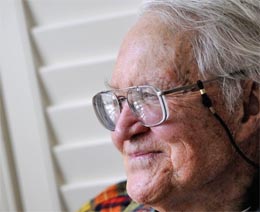On February 3, 2012, the Washington Department of Ecology gives Spokane environmental activist Julian Powers (1926-2015) the Environmental Excellence Award for his work on global warming. This award, the department's highest honor, recognizes Powers' decades of work in educating the public about the consequences of climate change. Powers, a retired engineer, has been committed to spreading the word about global warming since the 1970s. He lectures on college campuses, sends information to legislators and writes dozens of letters-to-the-editor of local newspapers. Powers' friends call him Mr. Global Warming. Grant Pfeifer, the Department of Ecology's eastern regional director, says, "He had a vision so far ahead of cultural consciousness" (Kramer).
Becoming an Environmentalist
Powers grew up on a remote farm in Nez Perce County in Idaho. He joined the Navy at age 17 and later was commissioned as an officer, achieving the rank of lieutenant. He also worked as a civilian engineer with the Navy. He first began studying global warming in the 1970s after reading a book titled "Hothouse Earth by Howard A. Wilcox, who had been one of Powers' supervisors in the Navy.
The book made a "huge impression" on Powers (Dorn Steele). Powers later said that Wilcox was able to make surprisingly accurate predictions, despite not having access to the detailed climate data we have today.
When Powers retired at age 54, he traveled the world for 10 years and became alarmed at the level of environmental damage around the world – and alarmed about the increasing damage that climate change might bring. On an Indonesian train, he witnessed a man thoughtlessly tossing a Coke bottle out of the window, and he later said that, at that moment, "I became an environmentalist" (Powers interview).
Spreading the Word
Upon his return, he began to devote his considerable energy to spreading the alarm about environmental degradation and global warming. He moved to Spokane to care for his aging mother and in 1990 met speech pathologist Jane Cunningham at a Unitarian Universalist Church potluck in Spokane. They married in 1997 and joined forces to bring attention to the issue of climate change. "He would talk to anyone who would walk by," said Cunningham. "He sent information to legislators, to politicians, to environmentalists – anyone he could think of who would read it" (Kramer). He wrote dozens of letters to The Spokesman-Review newspaper in Spokane, attempting to spread awareness of an issue that did not yet occupy the mainstream.
"The global warming science is clear and compelling; we humans are changing the global climate," Powers wrote in a letter published in 1997. "If this trend continues, agriculture will be disrupted; severe droughts, floods and heat waves will increasingly occur; seas are estimated to rise over two feet in the next century. No nation can escape this danger" (Powers, "Mother Nature").
Powers and Cunningham were involved in many other organizations including the Lands Council and Friends of the Aquifer. They were key figures in the fight against a railroad refueling depot over the Spokane Valley-Rathdrum Aquifer. In 2009, they were honored as "Watershed Heroes" by the Sierra Club's Upper Columbia River Group and the Center for Environmental Law & Policy for their work on aquifer issues.
Leading by Example
"You lead by example," said Spokane Mayor Mary Verner at a 2009 ceremony (Dorn Steele). "People no longer think you're some crackpot on Earth Day," said Spokane County Commissioner Bonnie Mager. "Julian has forced people to look at global warming when others didn't want to" (Dorn Steele).
The Environmental Excellence Award was presented to Powers at the Lands Council's First Friday Open House at Spokane's Saranac Building on February 3, 2012. In presenting the award the Department of Ecology's Grant Pfeifer said, "Julian is a credit to our community because he speaks up and he wouldn’t stand for allowing climate change to sit on the back burner, out of sight. He and Jane have touched so many of us with their infectious energy, their courage, and their visionary understanding of the challenges of climate change" (Department of Ecology).

